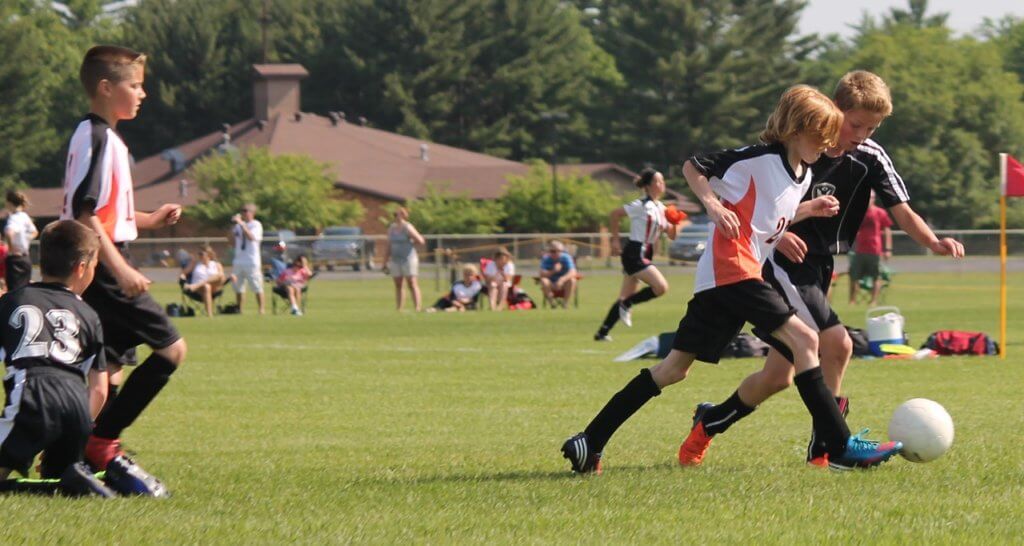The benefits of exercise can uplift your child and set them on the road to a health-filled life. We believe that the importance and benefits of physical activity simply cannot be understated.
Children who get daily exercise are more likely to be physically, mentally and emotionally healthier than their peers.
Plus, when children have a strong sense of physical and mental wellness, they are more likely to build a positive sense of self and experience positive interactions within their community.
Even during more emotionally turbulent teenage years, the mental benefits of sports and activity can help regulate your child’s emotions and sense of well-being.
As we’ve mentioned before, studies have found that keeping teens in sports can lead to higher paying, more impactful jobs, specifically among young women. But in order to experience the benefits of physical activity later in life, it’s best to develop a lifestyle of physical activity in our children.
Below, we breakdown the benefits of exercise on physical health, the benefits of exercise on mental health, and the social benefits of exercise for our kids. In all three cases, the long-term benefits of exercise are clear.
We hope this article inspires activity in the life of your child and family!
Top Five Benefits of Exercise for Kids: Physical Health
When we set out to list five benefits of physical activity, we wanted to first focus on how this activity benefits a child’s physical health. As it turns out, the benefits are felt across the full spectrum of a child’s physical wellness.

1) Heart disease prevention
Heart disease is the leading cause of death among Americans, and the second leading cause of death in Canada. As a result, caring for our children’s heart health is very important in helping them lead a long, healthy life.
The Heart Foundation explains that inactivity increases a person’s risk for heart disease by 50%.
Despite this huge increase in risk, just 30 minutes of moderate activity per day can help mitigate it.
Furthermore, the Foundation explains, “For each hour of regular exercise you get, you’ll gain about two hours of additional life expectancy.” That’s a life-changing return on investment! And like any good investment, the sooner your child begins contributing, the better off they’ll be later in life.
2) Healthy weight management
A sedentary lifestyle and poor eating habits can often lead to the development of unhealthy weight in children and teens. This weight can put extra stress on the heart, liver, lungs and other major organs.
In addition, unhealthy weight gain can cause joint injuries like recurring knee issues which may lead to kids and teens avoiding any further physical activity. This avoidance can exacerbate health issues and even negatively impact their mental health.
One of the many benefits of exercise in kids is healthy weight management. When exercising, more of the body’s energy stores can be burned to fuel a child’s play.
When energy stores are used as fuel, they are less likely to over-develop, stressing organs and joints to the point of injury. This not only prevents physical health issues, but it can also help develop positive mental and emotional health by allowing kids to participate in sports and games with their peers.
3) Physical activity boosts the immune system
Every parent is familiar with the development of their child’s immune system. Specifically, they’re familiar with the number of times young children get sick when encountering new germs at school!
Although science has not uncovered a sure-fire way to boost the immune system, Harvard Medical School says “your first line of defense is to choose a healthy lifestyle.” As part of that lifestyle they recommend commonly engaging in physical activity. They explain that physical activity “may contribute even more directly [to improving immune health] by promoting good circulation, which allows the cells and substances of the immune system to move through the body freely and do their job efficiently.”
In turn, one of the benefits of exercise for young children, is a benefit the whole family will enjoy. When your child’s immune system works efficiently, everyone has a better chance of avoiding another cold!

4) Improved dexterity and injury prevention
The more your child is active, the better they become at complex movement. Whether it’s a game of tag, or climbing into their treehouse, active kids are constantly teaching their body how to move.
Although a game of tag may seem simple; stopping, accelerating, turning and pivoting are all important movements that kids will replicate in a common sport like soccer.
If a child has hundreds of hours of practice with these movements, they’ll be much more likely to succeed in sport.
More importantly, children who have lots of practice with these movements are less likely to hurt themselves during more competitive games at school or in an organized sports league.
5) Reduced blood sugar levels
Diabetes is on the rise across the world. In America, 1 in 3 people have prediabetes today. Although some may view diabetes as a manageable disease, the condition is linked to an array of complications and elevated risks for other deadly diseases. So, the threat of diabetes is undoubtedly serious.
For this reason, controlling a child’s blood sugar levels is a concern many parents share. In addition to avoiding sugary food and drinks, physical activity can help your child steer clear of diabetes. This is because active children build muscle when they play. As their muscles work, they use glucose as an energy source which helps manage the body’s blood glucose levels.
Top Four Benefits of Exercise for Kids: Mental Health
When it comes to developing and protecting a child’s emotional wellness, there are four benefits to physical activity that make it an essential daily practice.
As depression and mental illness are increasingly discussed across the globe, scientists are being drawn to study their prevention, treatment and effects. Below, we explain the benefits of exercise on mental health as they are understood today.

1) Protecting against depression
A 2017 depression study at the Norwegian University of Science and Technology found that physically activity in kids helps protect against the development of depression. During their four-year study researches followed roughly 700 children from ages 6 to 10 years old.
The study specifically looked at a child’s level of play that was “sweaty and roughhousing” in nature.
Children who commonly partook in this type of play were found to be less likely to develop symptoms of depression over the course of two years of study.
These findings show that children can help ward off depression just by engaging in play and staying active.
2) Decreasing stress
As the Harvard Medical School explains in their article on stress relief, “Exercise reduces levels of the body’s stress hormones, such as adrenaline and cortisol. It also stimulates the production of endorphins, chemicals in the brain that are the body’s natural painkillers and mood elevators.” From this excerpt, it’s clear that consistent physical activity for kids can help regulate their mood.
In other words, daily physical activity for your child means a daily dose of natural, mood-elevating neurochemicals!
3) Increasing self-confidence
Humans are innately tactile. As illustrated in the above Harvard Medical School quotation, we have built in reward systems in our brains that encourage physical activity. However, a neurochemical reward isn’t just a short-term boost in mood.
Instead, the mental benefits of physical activity can be cumulative and long lasting. As children continue to partake in daily activity, they can build their self-confidence. This feeling of confidence carries momentum that can transfer over to their friendships, community, and their studies!

4) Improving sleep
One of the greatest benefits of physical activity for kids is an improvement in sleep. Kids who engage in physical activity are less likely to suffer from psychological affects connected to high levels of cortisol and adrenaline, as noted above. This means they may be less likely to disrupt their built-in circadian rhythm. When the circadian rhythm is maintained, children will have an easier time falling asleep.
Furthermore, research has found that the blue light from screens disrupts sleep by reducing the release of melatonin which naturally helps trigger sleep.
When a child spends more time being physically active, they’re likely to spend less time in front of screens. This means less blue light, and more sleep!
In the bigger picture, physical activity improves sleep which rejuvenates the mind and body. When kids feel refreshed, they’re more likely to have the energy for physical activity the next day, which helps continue a cycle of good sleep.
The Social Benefits of Exercise for Kids
The social benefits of exercise can help a child develop their sense of well-being in a larger community. Even if a child participates in an individual sport like gymnastics or figure skating, they can still develop a social network of like-minded peers that share a common interest.
As we suggested in our article on the value of humble athletes, building a network of fellow athletes can allow children to lean on others for support during challenging times.
Furthermore, Scientific America recently found that “adults get a 50% boost in longevity if they have a solid social network.”
It can be argued then, that the social benefits of being physically active can directly contribute to the long-term wellbeing of a child if they develop a good social network through sport and continue to maintain that network during adulthood.

Summary: the physical, mental and social benefits of exercise for kids are vital to good health
The long-term benefits of exercise for children are all encompassing. In terms of heart health, the hours kids spend playing now can lead to twice the hours of a healthful life down the road. Childhood exercise also helps maintain a healthy weight, improves dexterity and prevents injury. During play, muscles absorb excess blood glucose and promote circulation which helps prevent diabetes and boosts the immune system.
Regular physical activity also provides numerous mental health benefits that can strengthen a child’s sense of well-being. These include protecting against depression, decreasing stress and increasing self-confidence. Furthermore, consistent exercise helps regulate sleep which keeps kids refreshed and ready to engage again the next day.
Lastly, the social benefit of exercise helps kids create a support system which may ultimately lead to an increase in longevity of 50% as adults! When you look at all the benefits of exercise, its clear that kids live a better life when they get active!
Want to better track and support the well-being of your club’s young participants?
Uplifter’s club software includes mobile achievement tracking tools, including individualized health & wellness goal tracking capabilities. Learn more here.









